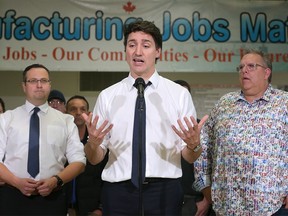
Article content
Less than two months after his government denied Windsor millions for housing initiatives, Prime Minister Justin Trudeau blamed city council’s lack of ambition for its failed funding pursuit during a visit this week.
Speaking with reporters on Thursday, Trudeau said his government created the Housing Accelerator Fund to encourage cities “to be really ambitious about housing, to change the rules of the game around density, around zoning, around use of public land.”
Advertisement 2
Article content
Article content
Windsor, which was ultimately eligible for about $30 million from the fund, submitted an application to Ottawa that proposed intensifying housing along major transit routes, most of downtown, and other select areas of the city.
But because council refused to allow fourplexes on any residential lot as-of-right — without public hearings or council votes — it lost out on any money from the multibillion-dollar fund.
“The City of Windsor chose to go a different way, and therefore there’s no housing accelerator funding for them,” Trudeau told reporters. “But we will continue to work with them on multiple programs.
“And if the City of Windsor decides to be more ambitious about its housing goals, we’re always there to talk.”
Trudeau said his government was “really pleased” to recently sign a HAF agreement with Tecumseh for $4.4 million — “because Tecumseh stepped up with an ambitious initiative.” Funding for the town was announced near the start of this month.
The same day Trudeau visited Windsor, Ontario Minister of Municipal Affairs and Housing Paul Calandra announced Guelph is getting nearly $4.7 million from the province’s Building Faster Fund for making “substantial progress” towards its 2023 housing target.
Advertisement 3
Article content
The City of Windsor missed out on funding from that pot, too.
In an interview with the Windsor Star on Friday, Windsor Mayor Drew Dilkens said it was “clear the prime minister was just reading speaking points that were handed to him,” and “had never actually reviewed” the city’s application, which was expected to create more than 2,100 additional units.
“What we disagreed with was fourplexes as-of-right in the city on every residentially zoned property and removing the current requirement to have public consultation — we just disagree with that, and I think the vast majority of the community also disagrees with that,” Dilkens said.
“We know what’s in our plan. We know our plan was ambitious.”
During a local visit earlier this week, Ontario Premier Doug Ford also had something to say about Windsor’s housing efforts and how other municipalities have been successfully tapping into new funding.
At an announcement Monday of a $50-million provincial grant for a new interchange at Banwell Road and E.C. Row, Ford pointed out that Windsor had fallen short of its 2023 goal of 953 housing starts.
Advertisement 4
Article content
As a result, Windsor missed out on $3.4 million from Ontario’s Building Faster Fund in February.

“Full disclosure, I love Mayor Dilkens. I know he’s going to do a great job. (Windsor’s) at 36 per cent, but I’m confident he’s going to hit those targets,” Ford said.
“It’s easy money — the Building Faster Fund, I know he’s going to do it. We need it, with all this development coming.
“He’ll get it done. I’m confident, 100 per cent.”
Windsor boasted a record number of building permits for housing last year — permits for 1,154 residential units — but the permits weren’t enough to qualify the city for provincial funding. For a time, there was confusion at city hall about what counted as a “housing start” and how Windsor could be so far below its targets.
Asked what his government was doing to ensure municipalities understood the metrics used to track housing, Ford said his government is “handing out cheques right left and centre, so everyone seemed to get the program. Some hurdles, but we’re always there to help municipalities.”
The province uses housing data from the Canada Mortgage and Housing Corporation to track residential development in each municipality. The federal Crown agency hires people to physically go out and count housing starts — projects where construction has begun and concrete foundations have been poured.
Advertisement 5
Article content
Recommended from Editorial
-

What you need to know about Windsor’s failed Housing Accelerator Fund pursuit
-

Poilievre blames Liberal ‘turf war’ for Windsor losing millions in federal housing funds
-

Windsor housing price hikes double the national average during COVID
-

Golf course parking lot, high school lands eyed for Windsor housing
Dilkens said it took a “lot of effort” from city staff to get a “full handle” on how CMHC does its counts. CMHC excludes long-term care homes and student housing from its housing tracker data, he said — units that would have increased Windsor’s housing start numbers last year.
The mayor also acknowledged the record number of building permits issued in Windsor in 2023. He said he told the premier there were developers who “didn’t put a shovel in the ground by the end of the year” because of interest rates.
“When it comes to housing, we understand the importance, we understand the need to add more supply,” Dilkens said.
“We’re going to do our darndest to meet these targets — we’re going to meet them or we’re going to die trying.”
Article content







